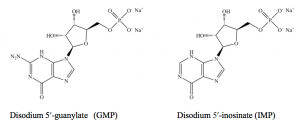What Is Disodium 5′-ribonucleotides (E635) In Food? Uses, Safety, Side Effects

What is it |Production | Uses | Safety | Side Effects
Disodium 5′-ribonucleotides, also known as I+G, is a flavor enhancer made of disodium inosinate (E631) and disodium guanylate (E627) with the ratio 1:1. The European food additive number for it is E635. It can be used in synergy with MSG (E621) to provide umami taste or as a replacement for MSG.
What is disodium 5′-ribonucleotides?
Definition
Disodium 5′-ribonucleotide is a mixture of nucleotides disodium guanylate and disodium inosinate, in the proportion of 50% each.
How is it made?
Both E631 and E627 can be produced from yeast extract or from the fermentation of carbohydrate and then through reaction with sodium hydroxide.
Specification
Other Names
- I+G
- IMP+GMP
- Sodium ribonucleotides
- Disodium inosinate and guanylate
CAS Number
NA
Chemical formula
- C10H11N4O8P · nH2O
- C10H12N5Na2O8P · nH2O
Molecular Weight
NA
Structure

From EFSA
Properties
Appearance
An odourless, white powder or granular.
Stability
Easy to absorb water in the air, around 20-30% of water.
Solubility
- In Water: soluble in water, 25g in 100ml water in 20 degree.
- In Organic Solvents: sparingly soluble in ethanol, practically insoluble in ether.
What are the uses?
I+G is a natural, vegan, and gluten free ingredient that can be used as a flavor enhancer to substitute monosodium glutamate (MSG) in MSG free food. It can also be used with MSG at the usage level around 2-10% of MSG to provide a synergistic enhancement of umami taste in sauces, seasonings and condiments.
The following are the common food uses of I+G and the added levels recommended by the manufacturer, Ajinomoto (1):
- Meat products: ≥ 0.01%
- Broths: 0.50 – 1.00%
- Soups: 0.20 – 0.30%
- Spices (10% salt or higher): 0.25-2.8%
- Snacks:0.02 – 0.03%
- Tomato sauce: 0.02 – 0.04%
- Mustard: 0.02 – 0.04%
- Salad dressings: 0.01 – 0.02%
- Vegetable preserves, fish byproducts, frozen food, biscuits, pasta / dough: 0.01%
Is disodium 5′-ribonucleotides safe?
Yes, its safety when used as a food additive has been approved by the U.S. Food and Drug Administration (FDA), European Food Safety Authority (EFSA), Joint FAO/WHO Expert Committee on Food Additives (JECFA), as well as other authorities.
FDA
We can see FDA approved disodium guanylate and disodium inosinate as a direct food additive that may be safely used as a flavor enhancer in foods. However, cannot find such information of I+G.
EFSA
Disodium 5′-ribonucleotides (E635) is listed in Commission Regulation (EU) No 231/2012 as an authorised food additive and categorized as “additives other than colours and sweeteners” (2)
Its usage level in food and beverages for human consumption needs to be re-evaluated together with IMP and GMP, which was requested since Oct, 2018. (3)
UK Food Standards Agency
Categorized in “Others” (4)
Food Standards Australia New Zealand
It is an approved ingredient in Australia and New Zealand with the code number 635. (5)
JECFA
Functional class: Food additives: flavor enhancer. (6)
Acceptable daily intake: ADI “not specific” was set in 1974. (7)
What are the Possible Side Effects
It is common that sometimes consumers have health concerns if disodium 5′-ribonucleotides is bad for our health and what are the dangers. Like with disodium guanylate and disodium inosinate, it is generally considered safe and almost has no reported side effects. (8).
Conclusion
Now you may have a good knowledge of the flavour enhancer – disodium 5′-ribonucleotides (E635), from its production, uses, approved safety, possible side effects.
What kinds of food packaging have you found this ingredient in? Let me know in the comments.



It’s found in maggi masala packet in india as flavour enhancer (635). I hope it’s safe to consume maggie now as it does not contain msg other than flavour enhancer (635).
I find it at pran noodle.
It is found in Bisto gravies – in all the standard and ‘best’ ranges, used together with MSG. Also now found in Cheetos, the cheese flavoured snack I used to have as a kid.
It is not safe for everybody. It should be banned, or at the least foods containing it should be made to clearly declare it on the label and stop trying to hide it, as I’m often finding is the case.
Since January this year (it’s now June) my forehead and cheeks have reddened and reddened. At first I just assumed it was the winter weather. Then my ears, then my nose, started to be affected. Horrendous dry skin. Pus filled spots. Definitely extra fluid in my face.
Was quite the mystery. Through an elimination diet, at the end of March this year I finally discovered the cause was the Bisto gravy I had bought three months earlier. What’s very surprising is I was only having a small jug of gravy once a week.
It is now late June. Three months without further poisoning myself, and my recovery is dreadfully slow. Redness still on the face but lessening. Pus spots now replaced by blood spots. Still noticing face can look ‘heavy’ every so often, from the extra fluid.
I’m now thinking it will be towards the end of the year for the effects to clear up, though I haven’t dismissed that the damage could well be permanent.
I’m frankly appalled by what it has done to my face. I don’t have any allergies that I know of and have never had to read food labels to avoid stuff.
Due to E635 I now have to read food labels properly. I’ve seen it mostly listed by one of its names rather than its E number. Irritating, because manufacturers seem to want to hide they’ve used it despite the damaging side-effects it can have.
Google ‘Ribo Rash’. The Australian website, fedup.com.au is an excellent resource for how bad this additive can be for those who are sensitive to it.
Hi,
I wanna make sure is E635 really vegan ?
Is it really made from plant based not animal derivatives ?
Thank you
Hi Nia,
Yes, it is vegan.
You can refer to the authority websites I linked to for the double check.
Hey! I think you should double check with producer since the source might differ… http://food-info.net/uk/e/e635.htm
I found it in wotsits
How much use in 100 kg gravy
This is contained in Bovril powdered drinks
Found in Frozen Seaweed Salad – G&L brand. Imported by 1728435 Ontario Inc.
All nucleic acid food additives may cause nightmares, agitation and excitation. It is not known if the chemical impurities in the manufacturing process, which are always present, even in pharmaceutics, are the cause. Dr D, M.D.
I found in LAYS E635 No MSG.
i want guide about use of flavor enhancer and thickeners can you help me
It’s on Doritos along with monosodium glutamate.
Is E635 halal??
I found Disodium 5′-ribonucleotides (E635) in the ingredients list of Damora (Aldi brand) sour cream & chives flavoured rice cakes
@APW – 100% correct. We returned to South Africa from the UK with some Bisto gravy recently and precisely the same thing happened to my wife. Her face reddened slowly over the last couple of months. Initially, we thought it was an allergy of some kind then just today, connected it to the Bisto. Your comment would have saved me much searching if I’d found it earlier